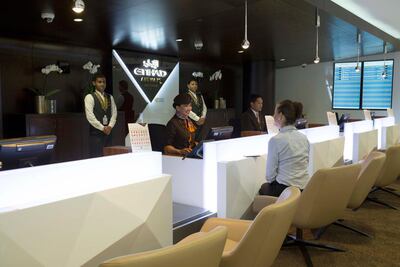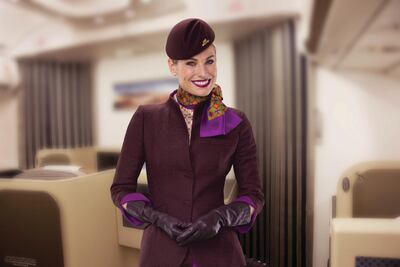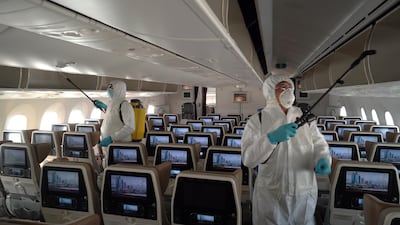Air travel is one of the areas where the effects of Covid-19 have been most striking. Almost overnight, demand for flights dropped, as countries imposed strict travel restrictions. Airlines have been updating booking policies, making schedule changes and cancelling flights to places worst hit by the outbreak. Older passengers are being advised to avoid long-haul flights, and although other travellers continue to fly, they do so cautiously.
In airports and on aircraft, there's a heightened sense of awareness as thermal sensors scan passengers for signs of the virus and cabin crew hand out health declaration forms. In such a time of crisis, it is time for candour.
This was a point stressed by Etihad Airways when asked how it was keeping travellers safe on its planes. While the airline is taking its responsibility seriously, it is also keen to remind travellers that they are also accountable.
"It's very important that passengers are self-aware," says Dr Nadia Bastaki, vice president of medical services at Etihad. "This is imperative because we need to protect a certain group of people – the elderly and those with chronic and underlying medical conditions. This is bigger than just being about passengers, it's about communities and how travellers can support their community."

This onus on passenger responsibility is one reason the airline says it has introduced new flexible booking policies. These measures allow anyone booking flights with Etihad to any destination across the airline network to make a change to their travel plan without paying a change fee.
"If travellers have a flight booked tomorrow and have any symptoms, I would advise them not to fly," says Bastaki. "It's why we've increased the flexibility of our booking policies. We don't want people to not say that they're sick or not inform the airline about health conditions because they think they'll have to pay fees."
Yet, as much as there is an onus on passengers, Etihad has also stepped up several measures to help prevent the spread of Covid-19. From updating cleaning polices to routine health checks for cabin crew and the roll-out of deep-cleaning at destinations across its network, the airline has some strict health procedures in place.
Lessons from the past

We've dealt with other communicable diseases before, so we've gone back and looked at the products we've used in the past to ensure they are as effective against Covid-19," says the Etihad doctor.
"The lessons we've learnt from previous outbreaks have been applied to the current situation. We've updated our standards as we've gone through different outbreaks. After H1N1, we updated certain things, then when it came to Mers, we updated other things. When it came to Ebola, we updated again," Bastaki explains.
One new measure that has been introduced is spraying cabins with disinfectant after every flight, to any destination in the network. “We use a spray called Bacoban, it can kill most viruses, including Covid-19. We were using it before, but we tested how effective it was against this virus. We found it kills the virus for 10 days,” explains Bastaki.
Cleaning procedures have also been stepped up. Before the Covid-19 outbreak, a full deep-clean only happened at Etihad's home base in Abu Dhabi. This procedure now happens across all destinations, on any layover longer than four hours.

"Every time the aircraft is grounded for long enough, we do a deep-clean. That means everything that can be replaced is, and every single surface is cleaned," she says.
On short layovers, the cleaning technique remains extensive. "We spray Bacoban all over the cabin. The toilet and galleys are deep-cleaned thoroughly. We also remove the toilet seats and replace them with new ones – that's very important.
Etihad aircraft are fitted with high-efficiency filters that recirculate the air from the cabin, mixing it with fresh air. Bastaki says this provides the cleanest and safest air possible, making the aircraft safer than the majority of malls or office blocks.
"The aircraft is fitted with Hepa filters, which have the same standard as a surgical room, a place that's considered very sterile," she says. "Everyone is not sharing the same air, it's zone-related. Only every three or four rows of seats would share a circulation. The air moves around this zone in a circular motion, it goes up through the filters and then out, it's constantly being recirculated."
A team effort

Another critical element of Etihad's in-flight safety measures is its crew. "We have trained the crew in taking precautions. They have clear guidelines on what to do in terms of isolating passengers, making them wear masks and making sure that not everyone is exposed to the same person," details Bastaki. The team also follow strict instructions when on layovers in other countries, to lower their risk of exposure.
"From the airport, crew travel in Etihad transport to their allocated hotels where we've done a complete risk assessment. We tell them to stay in their rooms, not to use public transport and to have their meals in the hotel and use layovers as rest time," explains the doctor. "Once they're back in Abu Dhabi, they're tested at the airport along with all arriving passengers."
This is all part of the collective effort that the airline says is needed to help prevent the spread of Covid-19. As the situation continues to change, Etihad is constantly on alert. “We’re monitoring the situation on a daily basis, actually on an hourly basis. It’s important because it’s related to our flights, our operations – it’s important for us to communicate this as soon as we can to passengers and staff,” she explains.
“As citizens, as UAE nationals, as anyone living here – we need to be self-aware and responsible.”
Myth-busting with Etihad’s Dr Nadia Bastaki
Is flying business class safer than flying economy?
There’s no difference in risk level between passengers in business class and those in economy because the Hepa filters, the circulation and the cleaning methodology is the same from the front of the plane to the end. Everyone is treated the same.
Do I have a higher risk of breathing in germs on a plane than anywhere else?
The aircraft has better air circulation than many buildings as, depending on the ventilation systems used, it’s unlikely the air in them is circulated every three minutes like it is on our planes.
Can I still walk around the plane?
It’s not a good idea to use the aircraft as a walking platform, but walking around is still OK if you’re a healthy passenger. But if you’re sick – don’t.
Should I wear a face mask?
People who are sick should definitely wear a face mask. People who are not sick should not be wearing them.
Will I be at higher risk if I eat the food?
No. The most important thing is that before eating, use the hand sanitiser or wash hands properly with soap. Do this after eating also.
Do I need to wipe down my seat?
No, there is no need for this. It’s all clean, it’s protected and it will be for up to 10 days. It has been tested. Any passenger can wipe it down if they want but we would not put a passenger at risk.


